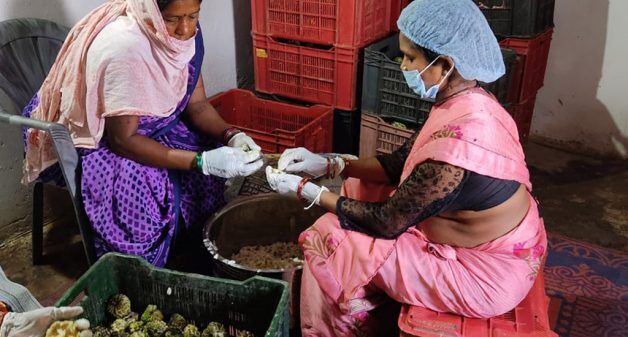Sitaphal income is raising the quality of life of tribal women in Chattisgarh.
From fancy restaurants to family-friendly ice creameries, the latest ice cream flavour of choice is custard apple — locally called Sitaphal in India. The sweet and textured nature of the fruit, which really does echo the flavour of custard, blends perfectly with cream. So it is no wonder the market can not get enough.
This is good news for the women of the tribal community in the Bastar district in Chhattisgarh, who are earning a good livelihood by growing custard apples — Sitaphal income — and extracting the delicious pulp to be used for ice cream and other products.
Sitaphal income: Tedious but fruitful work
42-year-old Punita Kumeti of Bastar has been cultivating custard apples and manually extracting pulp from the segmented and seeded fruit for years, thanks to the Durga Women’s self-help group, of which she is a member.
Every day she and the other members of the group take the lead in procuring and cultivating a variety of crops, processing the fruit into pulp, packaging it, marketing the product and saving the profits.
“I’ve been with this self-help group for several years now and there is enough work to sustain us throughout the year based on the different harvest seasons of a variety of forest produce,” said Kumeti.
Around 3,000 tribal women across North Bastar have been gainfully employed in 82 such self-help groups, formed by the Mahanadi Farmer Producer Organisation (FPO) and the Gadiya Farm Producers Company across nearly 50 villages.

The pulp is so popular it is also exported to places as far off as Greece and Germany for use in desserts and shakes well beyond the fruit’s harvest season.
Abundant organic fruits in India’s Naxal region
Bastar has an abundance of crops, such as custard apple, jamun, tamarind, mangoes, mahua and others that grow in the wild and are also farmed.
The custard apple from this region has been branded as Kanker Valley Custard Apples. What makes Bastar’s produce even more appealing is that it is entirely organic – cultivated without any fertiliser or pesticide.
Commercialising the produce and turning it into a revenue source, however, has not come easy, according to Satish Mishra of Vrutti – a non-profit organisation that aims to create sustainable livelihoods for marginalised people and supports the farm produce initiative.
“It’s taken us several years of efforts but we’ve been able to create a value chain in North Bastar. We collect data, maintain records and have established a system. We’ve been able to train the tribal community to not only create commercial products from their produce but also market them even if and when we are no longer around to support them,” said Mishra.
The region Kumeti calls home is a Naxal stronghold, with Maoist insurgencies and encounters over the years. With a 70% tribal population and a difficult terrain dominated by vast, dense forests, hills and wild animals, it is no surprise that Bastar lagged in economic and social progress.

The fruits, vegetables, millets and other produce native to the region were earlier used for local consumption. Beyond that there was no commercial gain. The middlemen who procured the tribes’ produce gave a pittance.
(ALSO READ: Traditional millet cultivation by Gonds needs revival)
But things are slowly changing.
Mishra put this down to the fact that decision making power in tribal communities tends to rest with women. “Power tends to lie with women in tribal communities. They are the ones who take the lead in all major tasks related to home, outdoors and savings,” said Mishra.
Of course, the women also carry out household chores every day as well as other work such as farming, collecting firewood and foraging for minor forest produce.
Government lends support to the custard apple cultivation in Bastar
Commercial cultivation and marketing of fresh produce and their by-products could not have been possible without support from the administration. The central government’s One District One Product Scheme gave the impetus and promotion to the value addition of custard apples in Bastar.
This has resulted in a 20% increase in profits and their ability to extract 10 tonnes of pulp this year.
Plans to scale this production are already in place once demand uncertainties caused by the pandemic taper off.
“We have a capacity to make 100 tonnes of custard apple pulp and there is demand for it both locally as well as from far off countries. But keeping in mind the pandemic situation and shelf-life limitations we restricted the output to 10 tonnes for this year,” said Mishra.
Infrastructural support for the initiative came from the district administration. Shammi Abidi, the former district collector, provided early funding for studying the required technology. Support from Vrutti, bank loans and share money made up for the rest of initial capital requirements.
After acquiring knowhow from Udaipur and Pune, women underwent training and upskilling.
In the case of custard apples, the women learnt everything from the correct technique of plucking the fruit to grading them, proper packing to ensure longevity, pulping the fruit and marketing the end product on a wide scale.

Tribes who had survived on a skewed barter system were also taught how to value their produce and ensure a fair price.
Women in rural Chattisgarh reap benefits
It is paying off.
Kumeti’s year-round occupation has provided a stable income, enabling her to educate her son who now studies in Eklavya, a residential school located in Jagdalpur, the district headquarters.
The future looks bright for Kumeti and the 11 other women of her self-help group who once lived in poverty. “Ever since we started working with the self-help group, we’ve been able to pool our profits and save collectively. This fund helps us take loans and avail of subsidies whenever we are in need,” said Kumeti.
The women of Bastar are now able to save an average of Rs 5,000 a month, after taking care of their household needs and children’s education. This is a far cry from the situation 10 years ago when they led a hand-to-mouth existence.
Future plans include scaling production and operations as well as branching out to marketing other produce and products like turmeric, jamun chips and custard apple powder.
Social entrepreneurship has seen aspirations of the women in Kanker Valley soar high. Their hard work has shown them that with the right guidance and direction, possibilities are endless.
(ALSO READ: Custard apple thrives in Maharashtra’s dryland farms)
Jharna Kukreja is a journalist based at Bengaluru.








